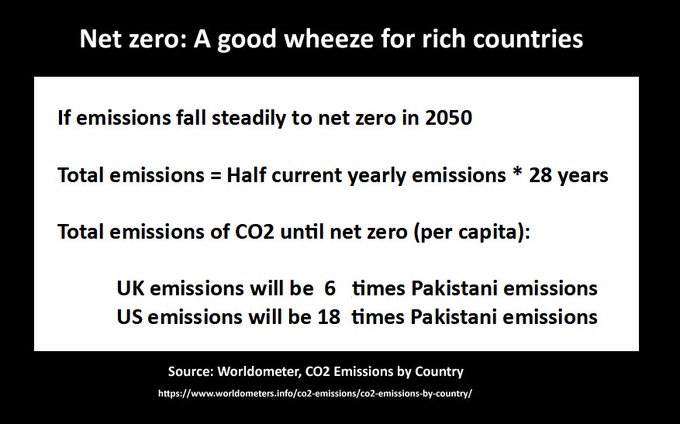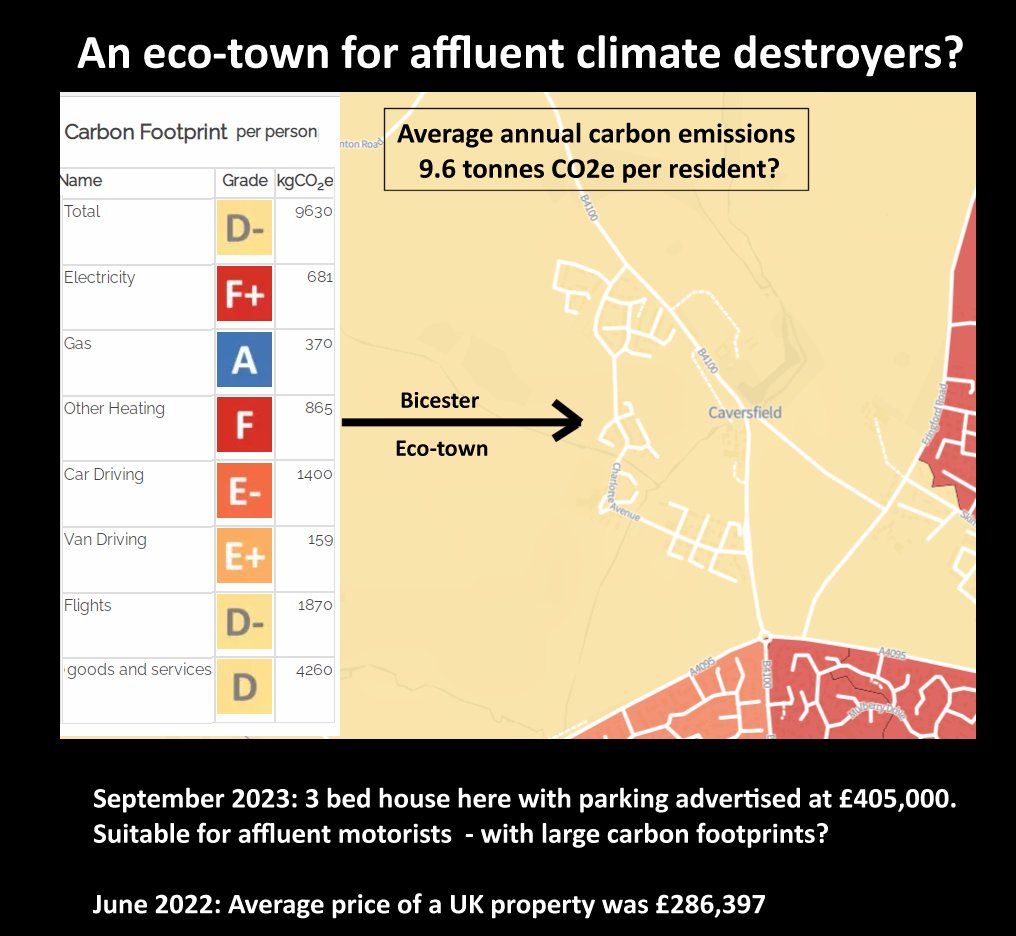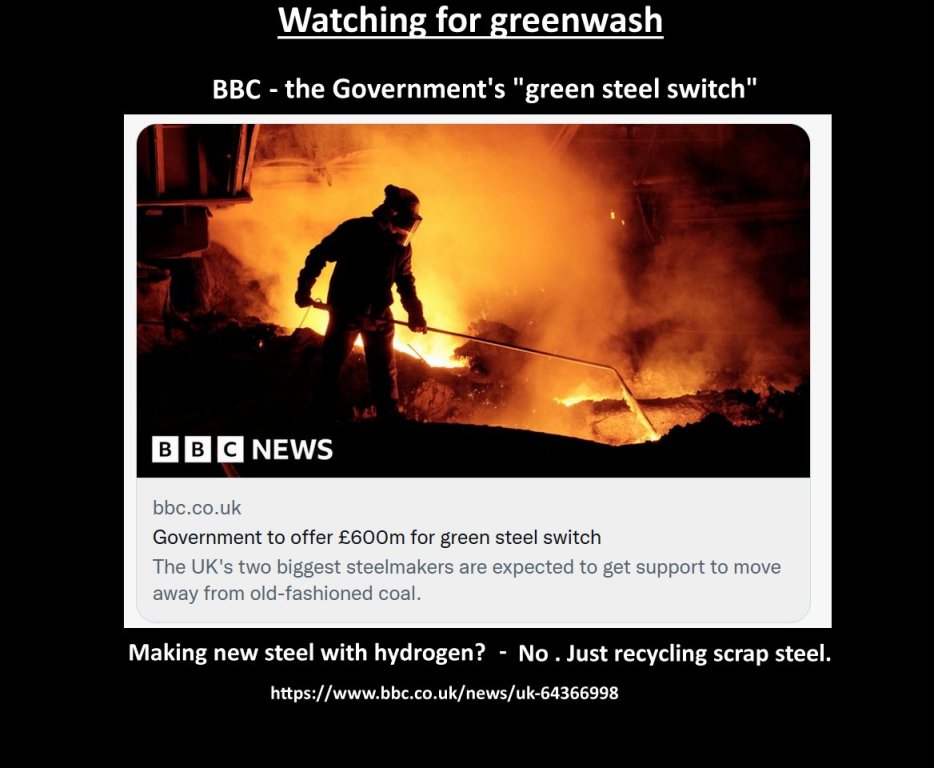Climate, Planning, Economy. 101+
0↓
Contents #101
- #101: Net zero: A good wheeze for the rich
- #102: In 2022, climate tipping points get noticed
- #103: EcoTowns aren’t Eco
- #104: Green belts restrict housing development
- #105: Car free housing for affordable homes
- #106: It’s hard to persuade people with cars to use buses
- #107: Brownfield sites should be nature reserves
- #108: The ONS is wrong on land values
- #109: Listen to the BBC for Government greenwash
- #110: Item 110
Goto 1 11 21 31 41 51 61 71 81 91 101
↑ #101: Net zero: A good wheeze for the rich
Two ways of measuring climate change are
- The remaining carbon budget. That’s how much CO2 can be emitted before a critical global surface temperature is reached. The budget to keep within the 1.5C suggested by the Paris Agreement is under 40 tonnes per person, which will be exhausted in less than 8 years.
- The date at which net zero CO2 emissions occur. Countries are being urged to set a date of 2050, in 28 years from 2022. A steady decrease in emissions of CO2 for 16 years might just fit within the 1.5C budget (if all countries followed the same path). Net zero in 2050 isn’t good enough.
If net zero is examined by country, it can be seen (once again) that the “developed” countries are well over budget, and the rest are well under. The Net Zero approach relies on poor countries emitting much less CO2 per person than the rich countries.
Net zero policies cheat the poor.

See more at:
↑ #102: In 2022, climate tipping points get noticed.
↑ #103: EcoTowns aren’t Eco (Originally October 2009)
Given the location of proposed ecotowns, the suspicion must be that the new residents will come from demographic groups that naturally have high footprints. The P2 People and Places demographic system identifies that the ecotowns on the shortlist (but not including Rossington) as typical places for demographic groups B4 (Rural Comfort) and C3 (Thriving Families). These groups are more likely to be frequent fliers and heavy users of transport fuel.
And a message from the government’s eco-town team:
Standard ET9 of the eco-towns Planning Policy Statement (PPS) concerns the zero-carbon standard in eco-towns, the standard includes all buildings within the town, both residential and commercial, but does not include embodied carbon or carbon emissions related to transport.
No embodied carbon measured. No transport emissions measured.
Then why call them eco-towns?
And now …

(Original: Eco-towns aren’t Eco)
↑ #104: Green belts restrict housing development
The most important restriction on the supply of planning permission are the green belts which surround many towns in the UK. Its restrictions benefit home owners and developers by limiting the supply of new housing, pushing up the value of housing new and old . Timothy Worstall of the Adam Smith Institute is scathing:
So, [Green Belt] law is there to ensure that upper middle class types may have that house looking out over rolling acres – without the costs of buying them – and still be able to
commute into those vibrant city economies.
In the contest for leadership of the Conservative Party Liz Truss saw the need to relax green belt policy:
We need to build a million homes on the London green belt near railway stations, and around other growing cities, specifically to allow the under 40s to be able to own their homes.
We should allow villages to expand by four or five houses a year without having to go through the planning system, so people can afford to live locally.
In contrast, Rishi Sunak’s campaign appealed to Conservative Party members by declaring strong support for green belts:
Rishi will use the forthcoming refresh of planning laws (the National Planning Policy Framework) to stop local authorities from requesting changes to Green Belt boundaries in order to release land for development and will order planning bureaucrats to automatically reject any such proposals.
Henry Hill in the New Statesman, commented:
Sunak at first seemed to understand [the need to relax green belt restrictions]. Now his change of tack suggests the Conservatives aren’t yet ready to ask the really hard questions about the UK’s structural problems.
Shame on you Rishi.
↑ #105: Car free housing for affordable homes
The House of Commons Science and Technology Committee noted:
In the long-term, widespread personal vehicle ownership does not appear to be compatible with significant decarbonisation.
So we must abandon cars to save the planet. Immediately, we could make all new housing car free.
This would be a bonus for the young and less wealthy because affluent motorists don’t compete for the new car free housing.
This cuts planning gain giving much cheaper new houses stopping the excess profits of developers who “benefit disproportionately and unfairly” from the current planning system – as noted in a Government White Paper.
See also
↑ #106: It’s hard to persuade people with cars to use buses
… because policies to change behaviour through individual choice have little effect.
Policy makers stick with them because of the political impact and policy makers own reluctance …
———————
“… in England and Scotland. We find dominant policy approaches do focus on individual choices, but significantly it is not because decision makers have faith in their effectiveness. These approaches persist in policy on carbon reduction for two reasons.
“One is appeal to a politically powerful, but incoherent, discourse of individualism. The second is that decision-makers do not want significant behavioural change.”
Carbon reduction and travel behaviour …Greg Marsden et al. (University of Leeds) G.R.Marsden@its.leeds.ac.uk
Perhaps it’s not just politics but policy makers’ wishful thinking too.
↑ #107: Brownfield sites should be nature reserves
Brownfield sites should become nature reserves and urban parks as has
happened with St Nicholas Fields, York or The Brickfields in Lower Halstow, Kent.
↑ #108: The ONS is wrong on land values
The Office of National Statistics calculates “UK land value”. But nearly all of their calculated value is the value of the Property Location Rights – the rights to have buildings on the land. These rights are created when planning permission being granted.
Incorrectly, the ONS classify the value of Land+Property Location Rights as “Natural Resources”. This is clearly incorrect. The grant of planning permission does not create a natural resource.
See:
- Planning permission is not a natural resource
- Planning gain in the York Local Plan
- The assetocracy & screwing the poor
↑ #109: Listen to the BBC for Government greenwash
BBC R4Today reported that the Govt are promising to fund electric arc furnaces to recycle scrap steel.
It’s being sold as a “green steel switch”.
Recycled steel is less polluting than coal based virgin steel but making steel using green hydrogen would be the real green steel switch.
Shame on you Justin Rowlatt.

